Case Study: Ethical Responsibilities and Breaches of ANZ Bank
VerifiedAdded on 2022/09/23
|9
|1720
|33
Case Study
AI Summary
This case study analyzes the ethical responsibilities of ANZ Bank, focusing on a recent incident involving workplace discrimination. It begins by defining business ethics and ethical responsibilities, then outlines the ethical obligations of Australian companies, as per the Fair Work Act 2009. The study highlights the breach of the UN Global Compact principles, specifically principle six concerning the elimination of discrimination, detailing how ANZ Bank failed to protect an employee from racial and sexual harassment. Corporate Social Responsibility (CSR) and business ethics theories, including instrumental and utilitarian approaches, are applied to evaluate the case. The study concludes with recommendations for the bank, such as adhering to the Fair Work Act, integrating UN Global Compact principles, and revising diversity management policies. The analysis underscores the negative consequences of unethical practices, emphasizing the importance of ethical conduct for maintaining a positive public image and employee trust.
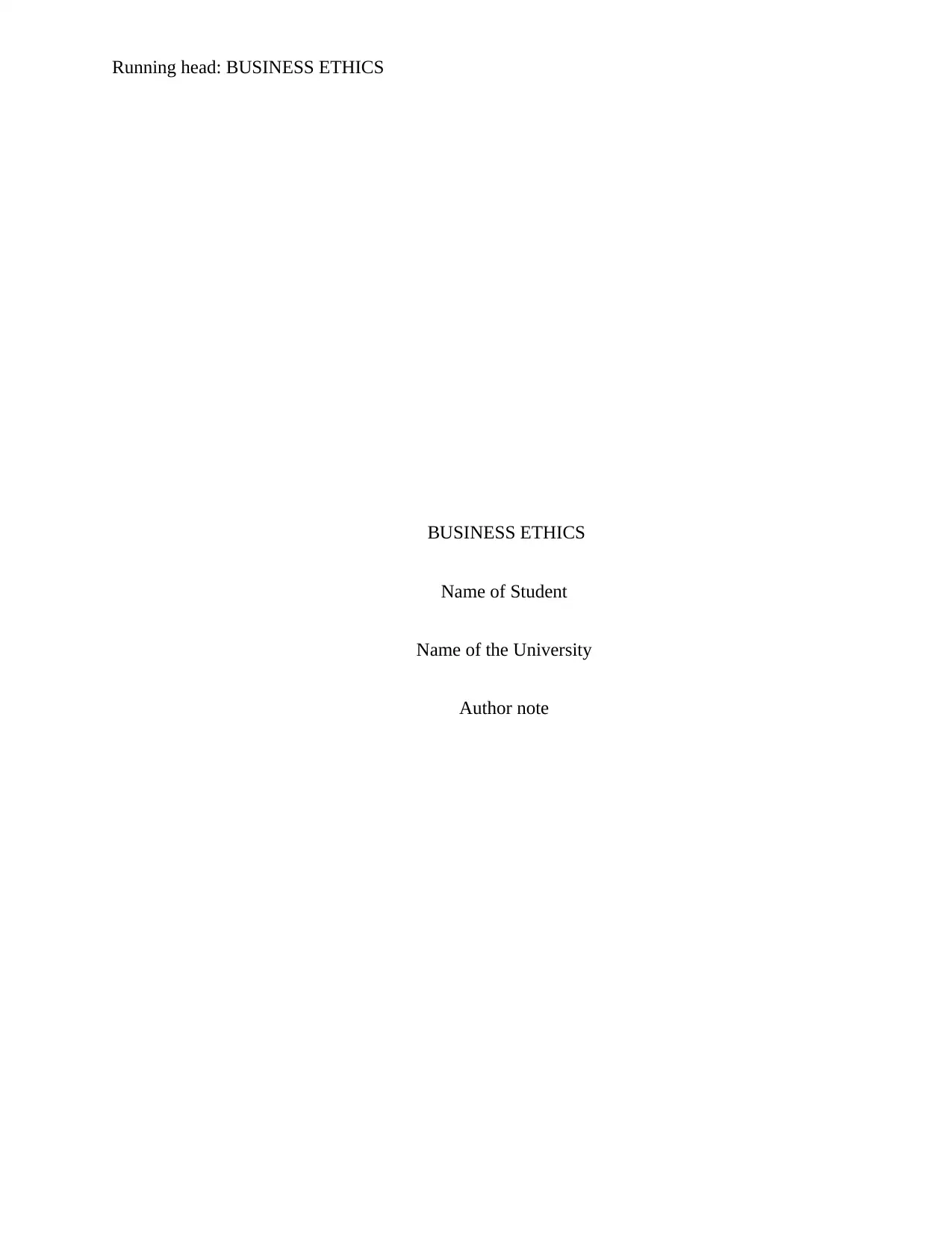
Running head: BUSINESS ETHICS
BUSINESS ETHICS
Name of Student
Name of the University
Author note
BUSINESS ETHICS
Name of Student
Name of the University
Author note
Paraphrase This Document
Need a fresh take? Get an instant paraphrase of this document with our AI Paraphraser
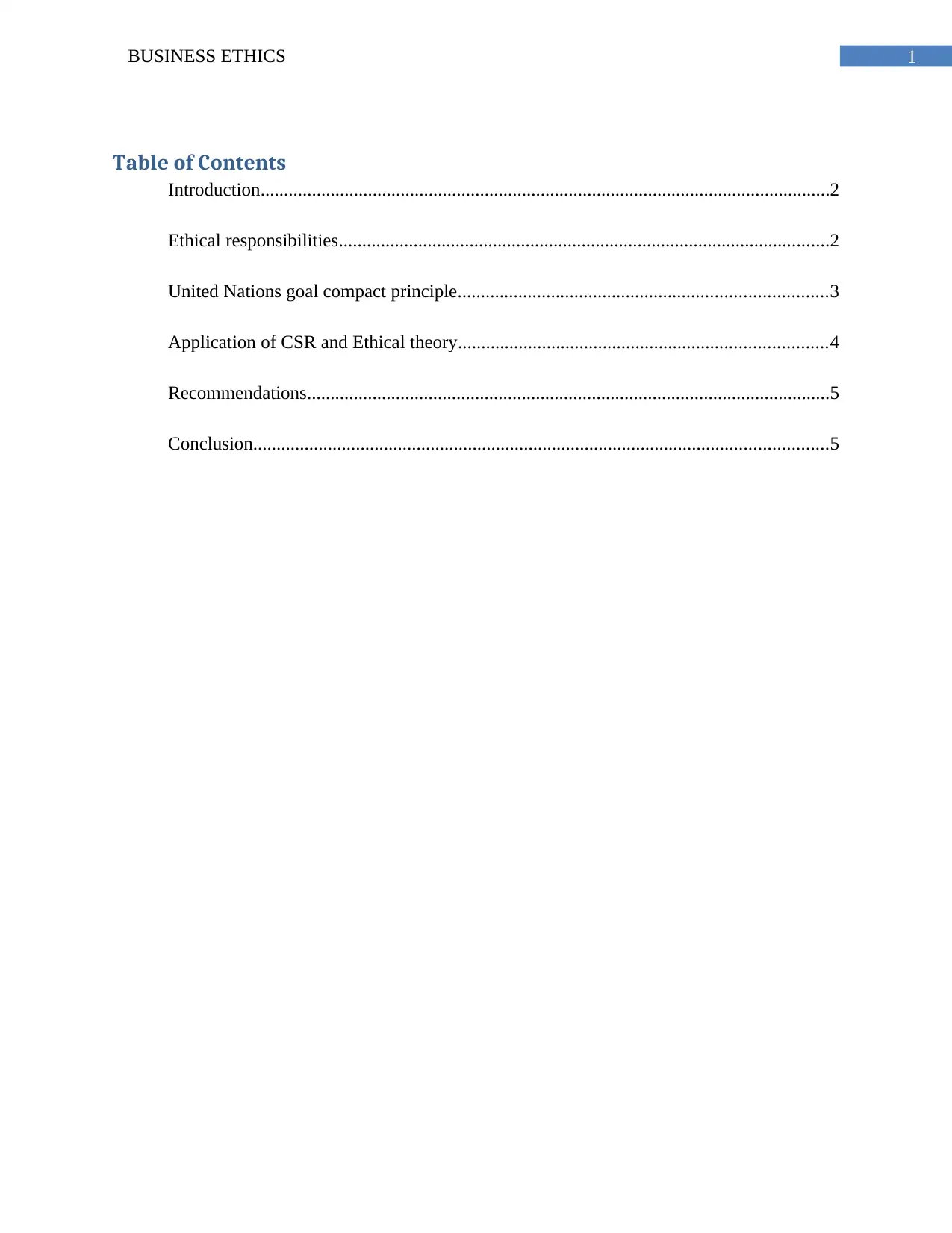
1BUSINESS ETHICS
Table of Contents
Introduction..........................................................................................................................2
Ethical responsibilities.........................................................................................................2
United Nations goal compact principle...............................................................................3
Application of CSR and Ethical theory...............................................................................4
Recommendations................................................................................................................5
Conclusion...........................................................................................................................5
Table of Contents
Introduction..........................................................................................................................2
Ethical responsibilities.........................................................................................................2
United Nations goal compact principle...............................................................................3
Application of CSR and Ethical theory...............................................................................4
Recommendations................................................................................................................5
Conclusion...........................................................................................................................5
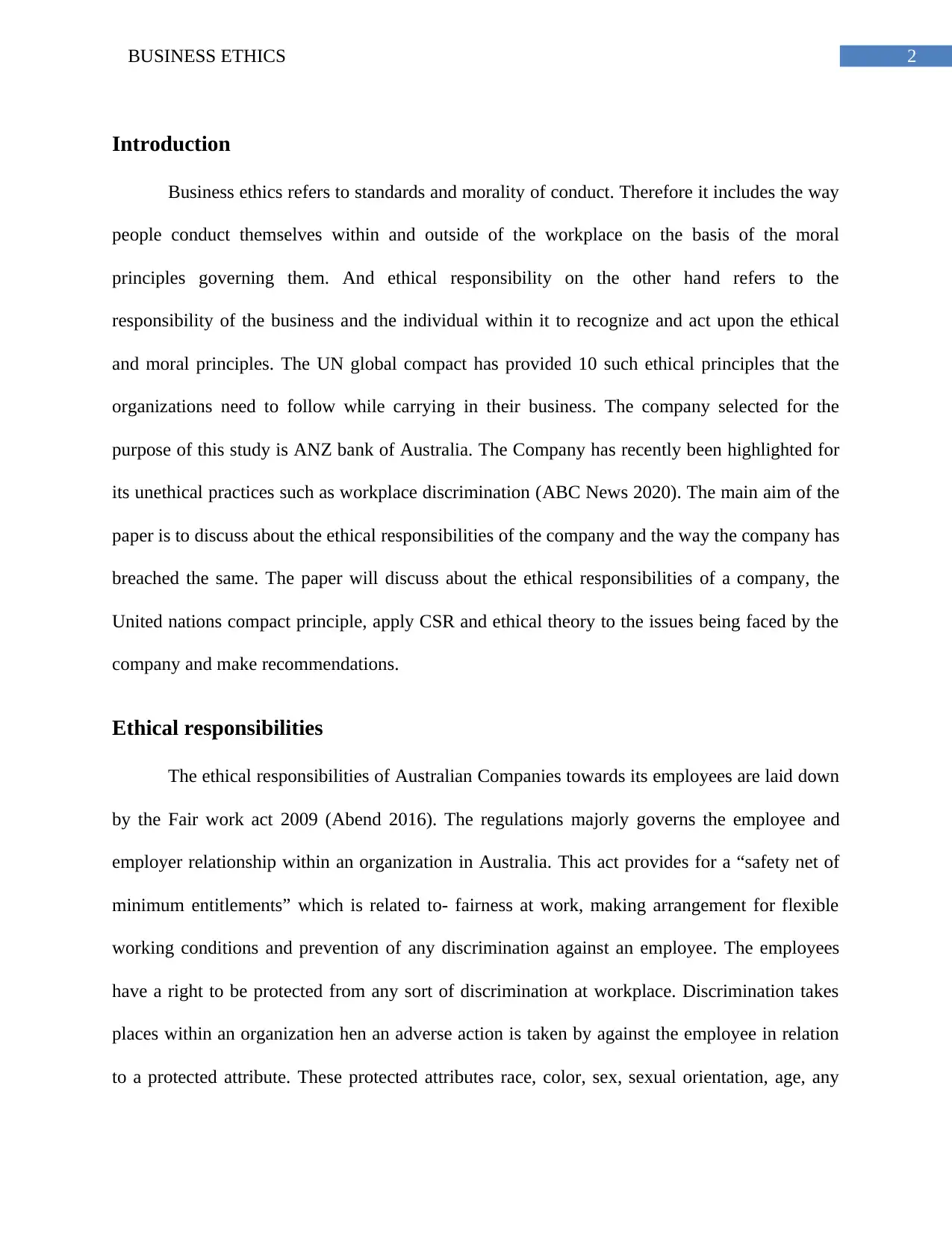
2BUSINESS ETHICS
Introduction
Business ethics refers to standards and morality of conduct. Therefore it includes the way
people conduct themselves within and outside of the workplace on the basis of the moral
principles governing them. And ethical responsibility on the other hand refers to the
responsibility of the business and the individual within it to recognize and act upon the ethical
and moral principles. The UN global compact has provided 10 such ethical principles that the
organizations need to follow while carrying in their business. The company selected for the
purpose of this study is ANZ bank of Australia. The Company has recently been highlighted for
its unethical practices such as workplace discrimination (ABC News 2020). The main aim of the
paper is to discuss about the ethical responsibilities of the company and the way the company has
breached the same. The paper will discuss about the ethical responsibilities of a company, the
United nations compact principle, apply CSR and ethical theory to the issues being faced by the
company and make recommendations.
Ethical responsibilities
The ethical responsibilities of Australian Companies towards its employees are laid down
by the Fair work act 2009 (Abend 2016). The regulations majorly governs the employee and
employer relationship within an organization in Australia. This act provides for a “safety net of
minimum entitlements” which is related to- fairness at work, making arrangement for flexible
working conditions and prevention of any discrimination against an employee. The employees
have a right to be protected from any sort of discrimination at workplace. Discrimination takes
places within an organization hen an adverse action is taken by against the employee in relation
to a protected attribute. These protected attributes race, color, sex, sexual orientation, age, any
Introduction
Business ethics refers to standards and morality of conduct. Therefore it includes the way
people conduct themselves within and outside of the workplace on the basis of the moral
principles governing them. And ethical responsibility on the other hand refers to the
responsibility of the business and the individual within it to recognize and act upon the ethical
and moral principles. The UN global compact has provided 10 such ethical principles that the
organizations need to follow while carrying in their business. The company selected for the
purpose of this study is ANZ bank of Australia. The Company has recently been highlighted for
its unethical practices such as workplace discrimination (ABC News 2020). The main aim of the
paper is to discuss about the ethical responsibilities of the company and the way the company has
breached the same. The paper will discuss about the ethical responsibilities of a company, the
United nations compact principle, apply CSR and ethical theory to the issues being faced by the
company and make recommendations.
Ethical responsibilities
The ethical responsibilities of Australian Companies towards its employees are laid down
by the Fair work act 2009 (Abend 2016). The regulations majorly governs the employee and
employer relationship within an organization in Australia. This act provides for a “safety net of
minimum entitlements” which is related to- fairness at work, making arrangement for flexible
working conditions and prevention of any discrimination against an employee. The employees
have a right to be protected from any sort of discrimination at workplace. Discrimination takes
places within an organization hen an adverse action is taken by against the employee in relation
to a protected attribute. These protected attributes race, color, sex, sexual orientation, age, any
⊘ This is a preview!⊘
Do you want full access?
Subscribe today to unlock all pages.

Trusted by 1+ million students worldwide
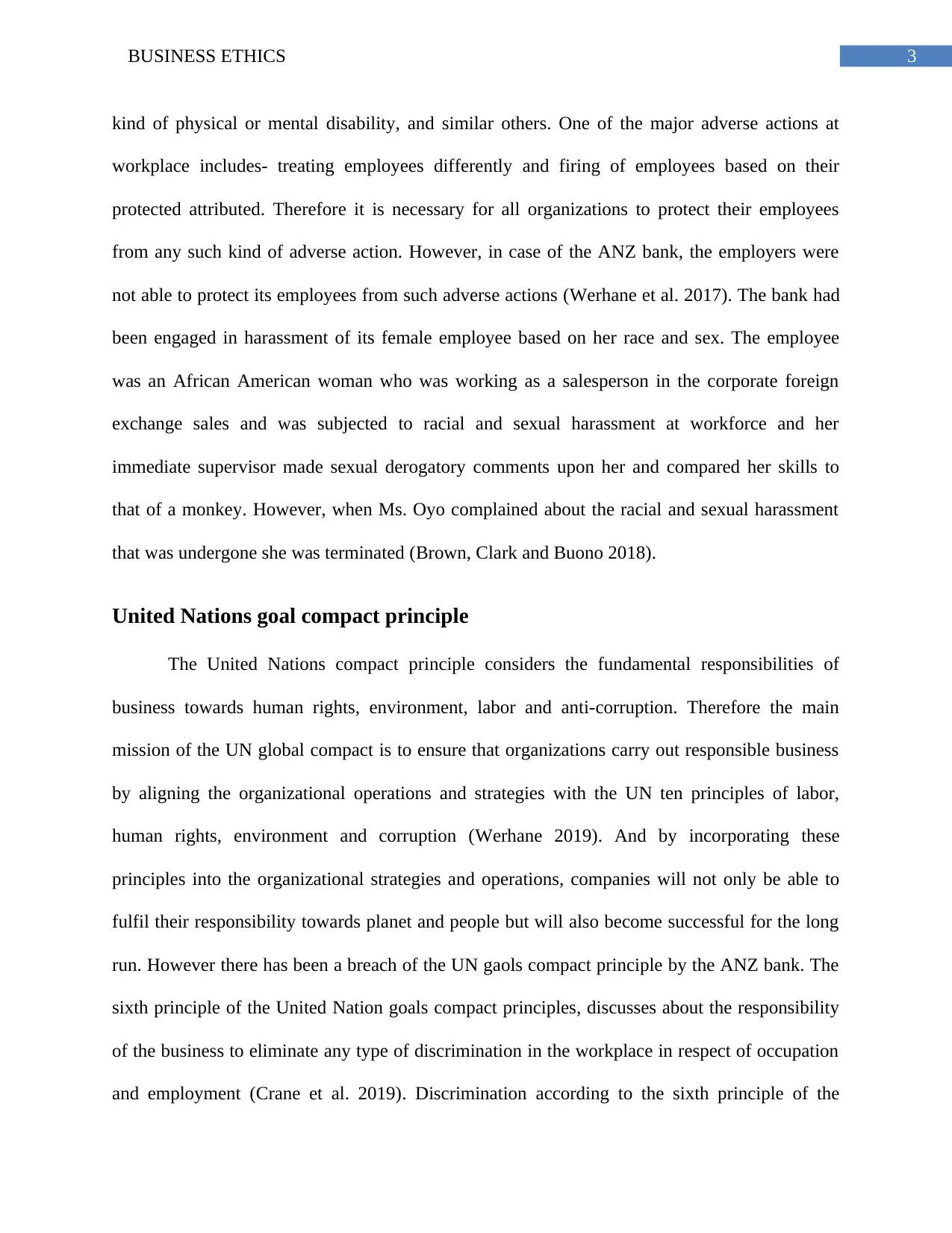
3BUSINESS ETHICS
kind of physical or mental disability, and similar others. One of the major adverse actions at
workplace includes- treating employees differently and firing of employees based on their
protected attributed. Therefore it is necessary for all organizations to protect their employees
from any such kind of adverse action. However, in case of the ANZ bank, the employers were
not able to protect its employees from such adverse actions (Werhane et al. 2017). The bank had
been engaged in harassment of its female employee based on her race and sex. The employee
was an African American woman who was working as a salesperson in the corporate foreign
exchange sales and was subjected to racial and sexual harassment at workforce and her
immediate supervisor made sexual derogatory comments upon her and compared her skills to
that of a monkey. However, when Ms. Oyo complained about the racial and sexual harassment
that was undergone she was terminated (Brown, Clark and Buono 2018).
United Nations goal compact principle
The United Nations compact principle considers the fundamental responsibilities of
business towards human rights, environment, labor and anti-corruption. Therefore the main
mission of the UN global compact is to ensure that organizations carry out responsible business
by aligning the organizational operations and strategies with the UN ten principles of labor,
human rights, environment and corruption (Werhane 2019). And by incorporating these
principles into the organizational strategies and operations, companies will not only be able to
fulfil their responsibility towards planet and people but will also become successful for the long
run. However there has been a breach of the UN gaols compact principle by the ANZ bank. The
sixth principle of the United Nation goals compact principles, discusses about the responsibility
of the business to eliminate any type of discrimination in the workplace in respect of occupation
and employment (Crane et al. 2019). Discrimination according to the sixth principle of the
kind of physical or mental disability, and similar others. One of the major adverse actions at
workplace includes- treating employees differently and firing of employees based on their
protected attributed. Therefore it is necessary for all organizations to protect their employees
from any such kind of adverse action. However, in case of the ANZ bank, the employers were
not able to protect its employees from such adverse actions (Werhane et al. 2017). The bank had
been engaged in harassment of its female employee based on her race and sex. The employee
was an African American woman who was working as a salesperson in the corporate foreign
exchange sales and was subjected to racial and sexual harassment at workforce and her
immediate supervisor made sexual derogatory comments upon her and compared her skills to
that of a monkey. However, when Ms. Oyo complained about the racial and sexual harassment
that was undergone she was terminated (Brown, Clark and Buono 2018).
United Nations goal compact principle
The United Nations compact principle considers the fundamental responsibilities of
business towards human rights, environment, labor and anti-corruption. Therefore the main
mission of the UN global compact is to ensure that organizations carry out responsible business
by aligning the organizational operations and strategies with the UN ten principles of labor,
human rights, environment and corruption (Werhane 2019). And by incorporating these
principles into the organizational strategies and operations, companies will not only be able to
fulfil their responsibility towards planet and people but will also become successful for the long
run. However there has been a breach of the UN gaols compact principle by the ANZ bank. The
sixth principle of the United Nation goals compact principles, discusses about the responsibility
of the business to eliminate any type of discrimination in the workplace in respect of occupation
and employment (Crane et al. 2019). Discrimination according to the sixth principle of the
Paraphrase This Document
Need a fresh take? Get an instant paraphrase of this document with our AI Paraphraser
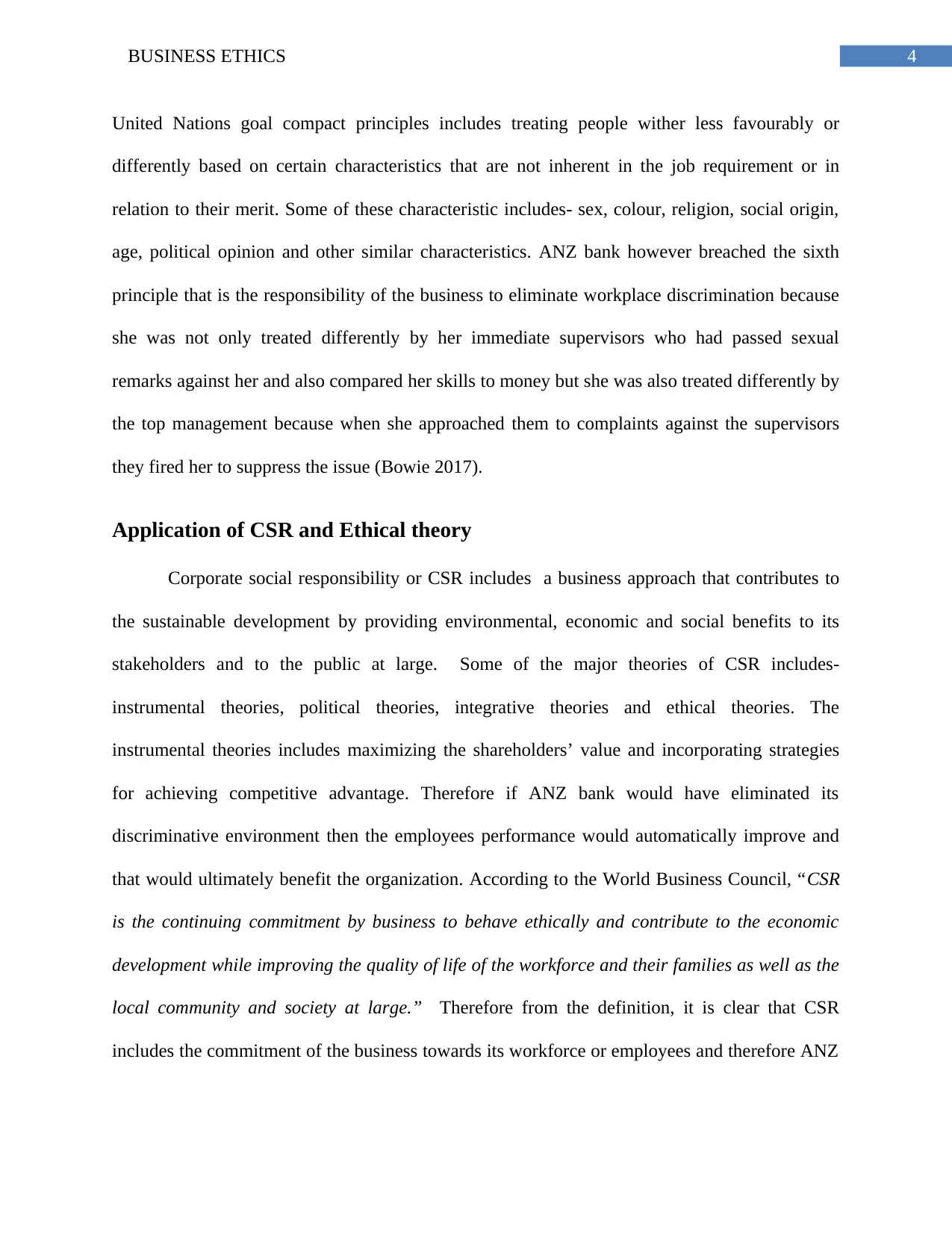
4BUSINESS ETHICS
United Nations goal compact principles includes treating people wither less favourably or
differently based on certain characteristics that are not inherent in the job requirement or in
relation to their merit. Some of these characteristic includes- sex, colour, religion, social origin,
age, political opinion and other similar characteristics. ANZ bank however breached the sixth
principle that is the responsibility of the business to eliminate workplace discrimination because
she was not only treated differently by her immediate supervisors who had passed sexual
remarks against her and also compared her skills to money but she was also treated differently by
the top management because when she approached them to complaints against the supervisors
they fired her to suppress the issue (Bowie 2017).
Application of CSR and Ethical theory
Corporate social responsibility or CSR includes a business approach that contributes to
the sustainable development by providing environmental, economic and social benefits to its
stakeholders and to the public at large. Some of the major theories of CSR includes-
instrumental theories, political theories, integrative theories and ethical theories. The
instrumental theories includes maximizing the shareholders’ value and incorporating strategies
for achieving competitive advantage. Therefore if ANZ bank would have eliminated its
discriminative environment then the employees performance would automatically improve and
that would ultimately benefit the organization. According to the World Business Council, “CSR
is the continuing commitment by business to behave ethically and contribute to the economic
development while improving the quality of life of the workforce and their families as well as the
local community and society at large.” Therefore from the definition, it is clear that CSR
includes the commitment of the business towards its workforce or employees and therefore ANZ
United Nations goal compact principles includes treating people wither less favourably or
differently based on certain characteristics that are not inherent in the job requirement or in
relation to their merit. Some of these characteristic includes- sex, colour, religion, social origin,
age, political opinion and other similar characteristics. ANZ bank however breached the sixth
principle that is the responsibility of the business to eliminate workplace discrimination because
she was not only treated differently by her immediate supervisors who had passed sexual
remarks against her and also compared her skills to money but she was also treated differently by
the top management because when she approached them to complaints against the supervisors
they fired her to suppress the issue (Bowie 2017).
Application of CSR and Ethical theory
Corporate social responsibility or CSR includes a business approach that contributes to
the sustainable development by providing environmental, economic and social benefits to its
stakeholders and to the public at large. Some of the major theories of CSR includes-
instrumental theories, political theories, integrative theories and ethical theories. The
instrumental theories includes maximizing the shareholders’ value and incorporating strategies
for achieving competitive advantage. Therefore if ANZ bank would have eliminated its
discriminative environment then the employees performance would automatically improve and
that would ultimately benefit the organization. According to the World Business Council, “CSR
is the continuing commitment by business to behave ethically and contribute to the economic
development while improving the quality of life of the workforce and their families as well as the
local community and society at large.” Therefore from the definition, it is clear that CSR
includes the commitment of the business towards its workforce or employees and therefore ANZ
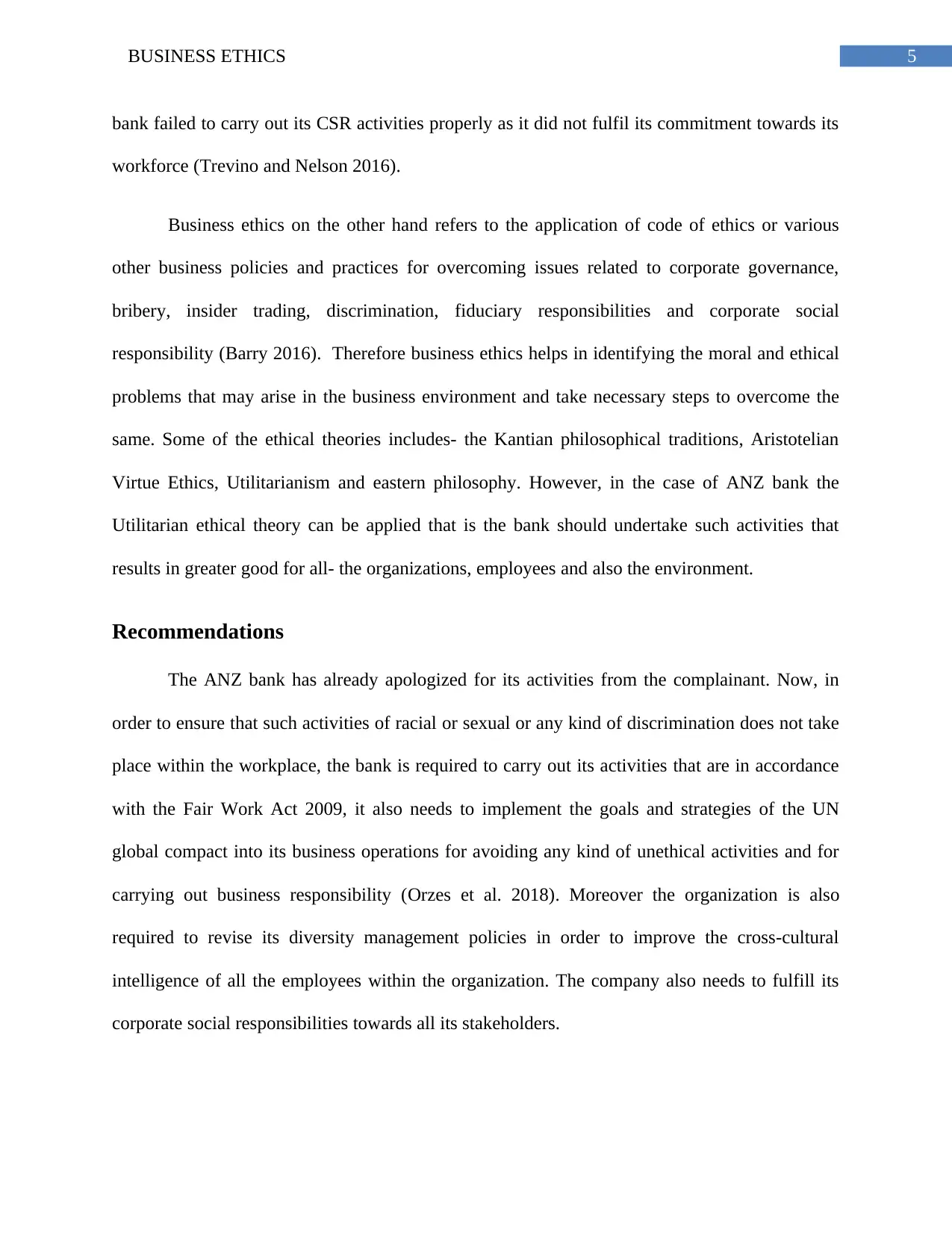
5BUSINESS ETHICS
bank failed to carry out its CSR activities properly as it did not fulfil its commitment towards its
workforce (Trevino and Nelson 2016).
Business ethics on the other hand refers to the application of code of ethics or various
other business policies and practices for overcoming issues related to corporate governance,
bribery, insider trading, discrimination, fiduciary responsibilities and corporate social
responsibility (Barry 2016). Therefore business ethics helps in identifying the moral and ethical
problems that may arise in the business environment and take necessary steps to overcome the
same. Some of the ethical theories includes- the Kantian philosophical traditions, Aristotelian
Virtue Ethics, Utilitarianism and eastern philosophy. However, in the case of ANZ bank the
Utilitarian ethical theory can be applied that is the bank should undertake such activities that
results in greater good for all- the organizations, employees and also the environment.
Recommendations
The ANZ bank has already apologized for its activities from the complainant. Now, in
order to ensure that such activities of racial or sexual or any kind of discrimination does not take
place within the workplace, the bank is required to carry out its activities that are in accordance
with the Fair Work Act 2009, it also needs to implement the goals and strategies of the UN
global compact into its business operations for avoiding any kind of unethical activities and for
carrying out business responsibility (Orzes et al. 2018). Moreover the organization is also
required to revise its diversity management policies in order to improve the cross-cultural
intelligence of all the employees within the organization. The company also needs to fulfill its
corporate social responsibilities towards all its stakeholders.
bank failed to carry out its CSR activities properly as it did not fulfil its commitment towards its
workforce (Trevino and Nelson 2016).
Business ethics on the other hand refers to the application of code of ethics or various
other business policies and practices for overcoming issues related to corporate governance,
bribery, insider trading, discrimination, fiduciary responsibilities and corporate social
responsibility (Barry 2016). Therefore business ethics helps in identifying the moral and ethical
problems that may arise in the business environment and take necessary steps to overcome the
same. Some of the ethical theories includes- the Kantian philosophical traditions, Aristotelian
Virtue Ethics, Utilitarianism and eastern philosophy. However, in the case of ANZ bank the
Utilitarian ethical theory can be applied that is the bank should undertake such activities that
results in greater good for all- the organizations, employees and also the environment.
Recommendations
The ANZ bank has already apologized for its activities from the complainant. Now, in
order to ensure that such activities of racial or sexual or any kind of discrimination does not take
place within the workplace, the bank is required to carry out its activities that are in accordance
with the Fair Work Act 2009, it also needs to implement the goals and strategies of the UN
global compact into its business operations for avoiding any kind of unethical activities and for
carrying out business responsibility (Orzes et al. 2018). Moreover the organization is also
required to revise its diversity management policies in order to improve the cross-cultural
intelligence of all the employees within the organization. The company also needs to fulfill its
corporate social responsibilities towards all its stakeholders.
⊘ This is a preview!⊘
Do you want full access?
Subscribe today to unlock all pages.

Trusted by 1+ million students worldwide
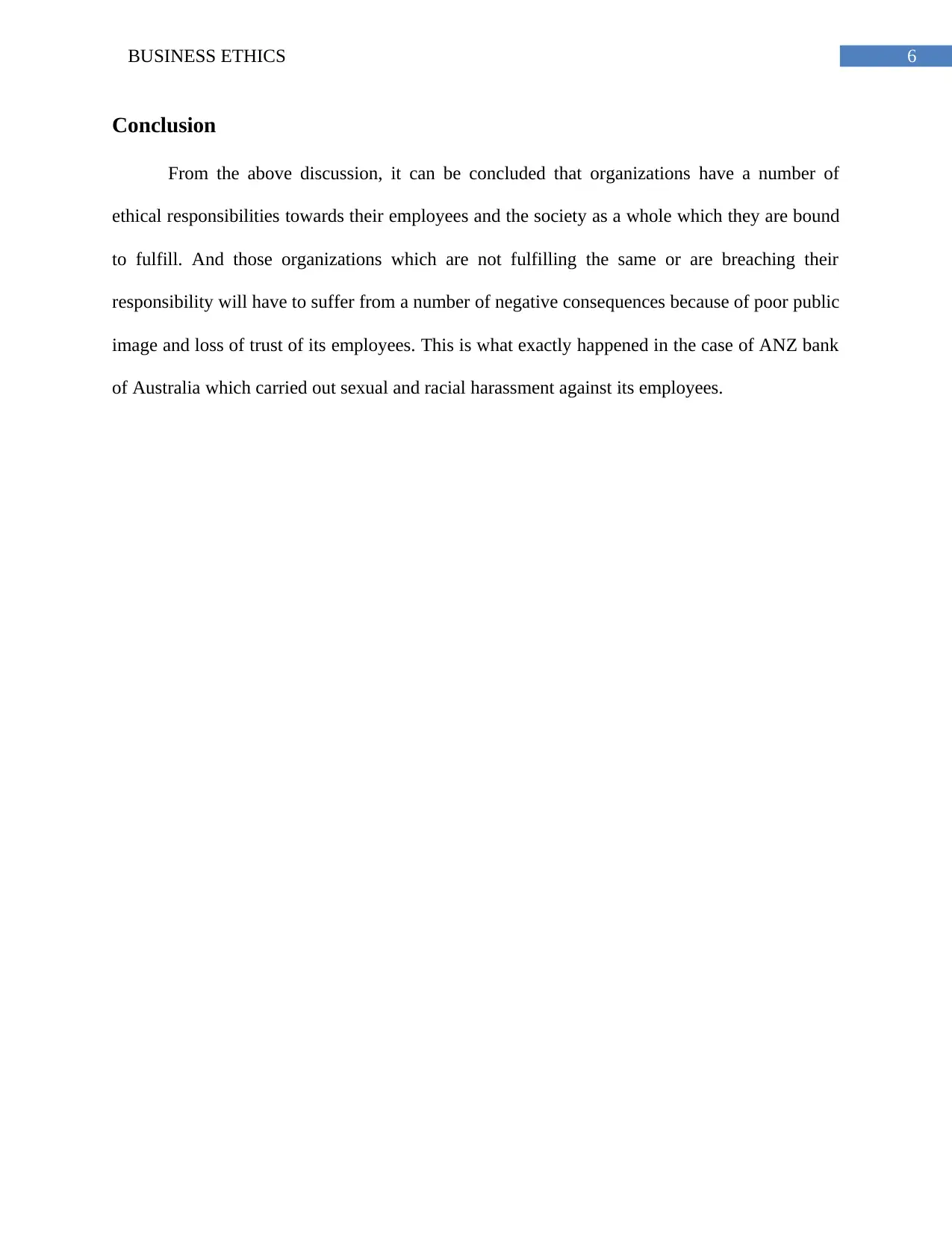
6BUSINESS ETHICS
Conclusion
From the above discussion, it can be concluded that organizations have a number of
ethical responsibilities towards their employees and the society as a whole which they are bound
to fulfill. And those organizations which are not fulfilling the same or are breaching their
responsibility will have to suffer from a number of negative consequences because of poor public
image and loss of trust of its employees. This is what exactly happened in the case of ANZ bank
of Australia which carried out sexual and racial harassment against its employees.
Conclusion
From the above discussion, it can be concluded that organizations have a number of
ethical responsibilities towards their employees and the society as a whole which they are bound
to fulfill. And those organizations which are not fulfilling the same or are breaching their
responsibility will have to suffer from a number of negative consequences because of poor public
image and loss of trust of its employees. This is what exactly happened in the case of ANZ bank
of Australia which carried out sexual and racial harassment against its employees.
Paraphrase This Document
Need a fresh take? Get an instant paraphrase of this document with our AI Paraphraser
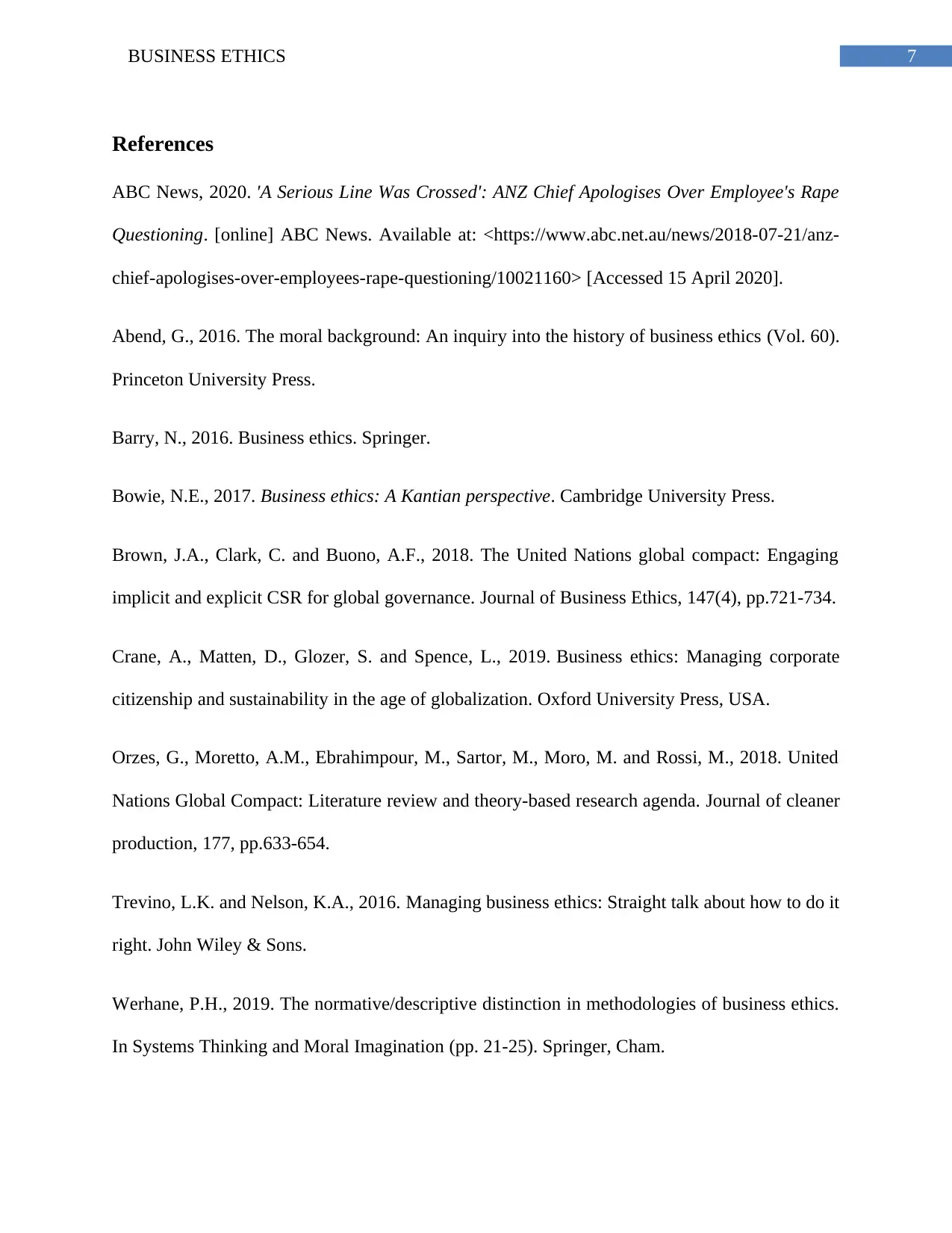
7BUSINESS ETHICS
References
ABC News, 2020. 'A Serious Line Was Crossed': ANZ Chief Apologises Over Employee's Rape
Questioning. [online] ABC News. Available at: <https://www.abc.net.au/news/2018-07-21/anz-
chief-apologises-over-employees-rape-questioning/10021160> [Accessed 15 April 2020].
Abend, G., 2016. The moral background: An inquiry into the history of business ethics (Vol. 60).
Princeton University Press.
Barry, N., 2016. Business ethics. Springer.
Bowie, N.E., 2017. Business ethics: A Kantian perspective. Cambridge University Press.
Brown, J.A., Clark, C. and Buono, A.F., 2018. The United Nations global compact: Engaging
implicit and explicit CSR for global governance. Journal of Business Ethics, 147(4), pp.721-734.
Crane, A., Matten, D., Glozer, S. and Spence, L., 2019. Business ethics: Managing corporate
citizenship and sustainability in the age of globalization. Oxford University Press, USA.
Orzes, G., Moretto, A.M., Ebrahimpour, M., Sartor, M., Moro, M. and Rossi, M., 2018. United
Nations Global Compact: Literature review and theory-based research agenda. Journal of cleaner
production, 177, pp.633-654.
Trevino, L.K. and Nelson, K.A., 2016. Managing business ethics: Straight talk about how to do it
right. John Wiley & Sons.
Werhane, P.H., 2019. The normative/descriptive distinction in methodologies of business ethics.
In Systems Thinking and Moral Imagination (pp. 21-25). Springer, Cham.
References
ABC News, 2020. 'A Serious Line Was Crossed': ANZ Chief Apologises Over Employee's Rape
Questioning. [online] ABC News. Available at: <https://www.abc.net.au/news/2018-07-21/anz-
chief-apologises-over-employees-rape-questioning/10021160> [Accessed 15 April 2020].
Abend, G., 2016. The moral background: An inquiry into the history of business ethics (Vol. 60).
Princeton University Press.
Barry, N., 2016. Business ethics. Springer.
Bowie, N.E., 2017. Business ethics: A Kantian perspective. Cambridge University Press.
Brown, J.A., Clark, C. and Buono, A.F., 2018. The United Nations global compact: Engaging
implicit and explicit CSR for global governance. Journal of Business Ethics, 147(4), pp.721-734.
Crane, A., Matten, D., Glozer, S. and Spence, L., 2019. Business ethics: Managing corporate
citizenship and sustainability in the age of globalization. Oxford University Press, USA.
Orzes, G., Moretto, A.M., Ebrahimpour, M., Sartor, M., Moro, M. and Rossi, M., 2018. United
Nations Global Compact: Literature review and theory-based research agenda. Journal of cleaner
production, 177, pp.633-654.
Trevino, L.K. and Nelson, K.A., 2016. Managing business ethics: Straight talk about how to do it
right. John Wiley & Sons.
Werhane, P.H., 2019. The normative/descriptive distinction in methodologies of business ethics.
In Systems Thinking and Moral Imagination (pp. 21-25). Springer, Cham.

8BUSINESS ETHICS
Werhane, P.H., Freeman, R.E. and Dmytriyev, S. eds., 2017. Cambridge handbook of research
approaches to business ethics and corporate responsibility. Cambridge University Press.
Werhane, P.H., Freeman, R.E. and Dmytriyev, S. eds., 2017. Cambridge handbook of research
approaches to business ethics and corporate responsibility. Cambridge University Press.
⊘ This is a preview!⊘
Do you want full access?
Subscribe today to unlock all pages.

Trusted by 1+ million students worldwide
1 out of 9
Related Documents
Your All-in-One AI-Powered Toolkit for Academic Success.
+13062052269
info@desklib.com
Available 24*7 on WhatsApp / Email
![[object Object]](/_next/static/media/star-bottom.7253800d.svg)
Unlock your academic potential
Copyright © 2020–2026 A2Z Services. All Rights Reserved. Developed and managed by ZUCOL.





